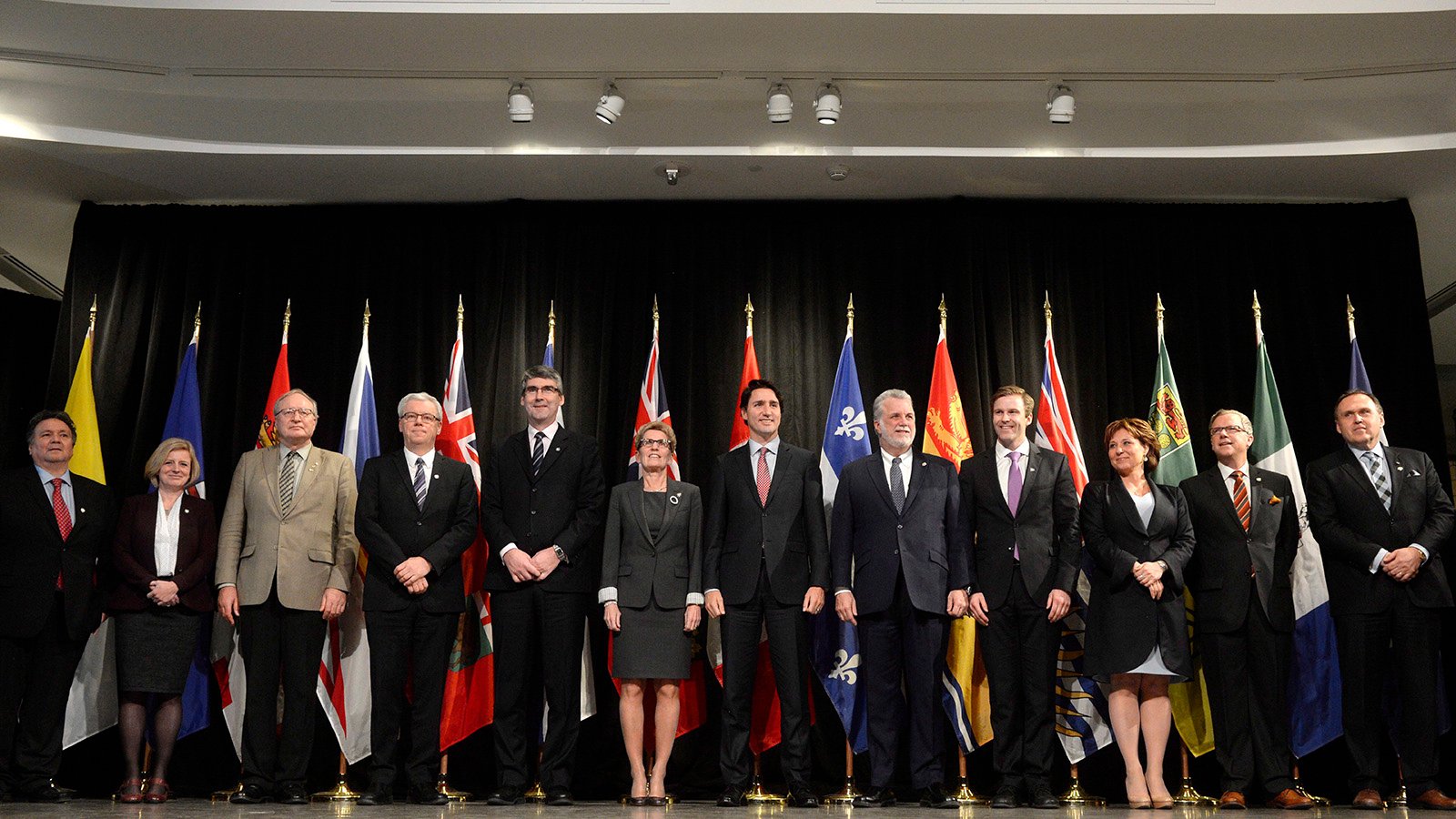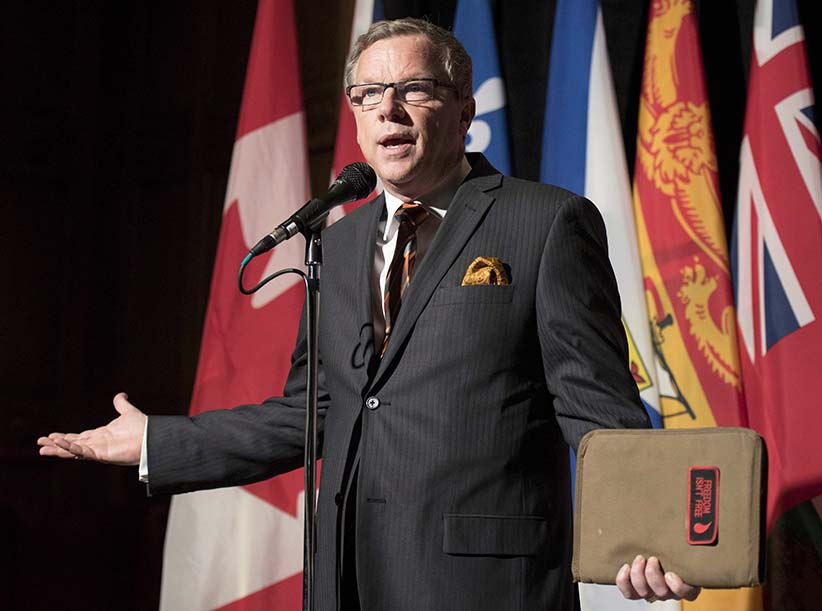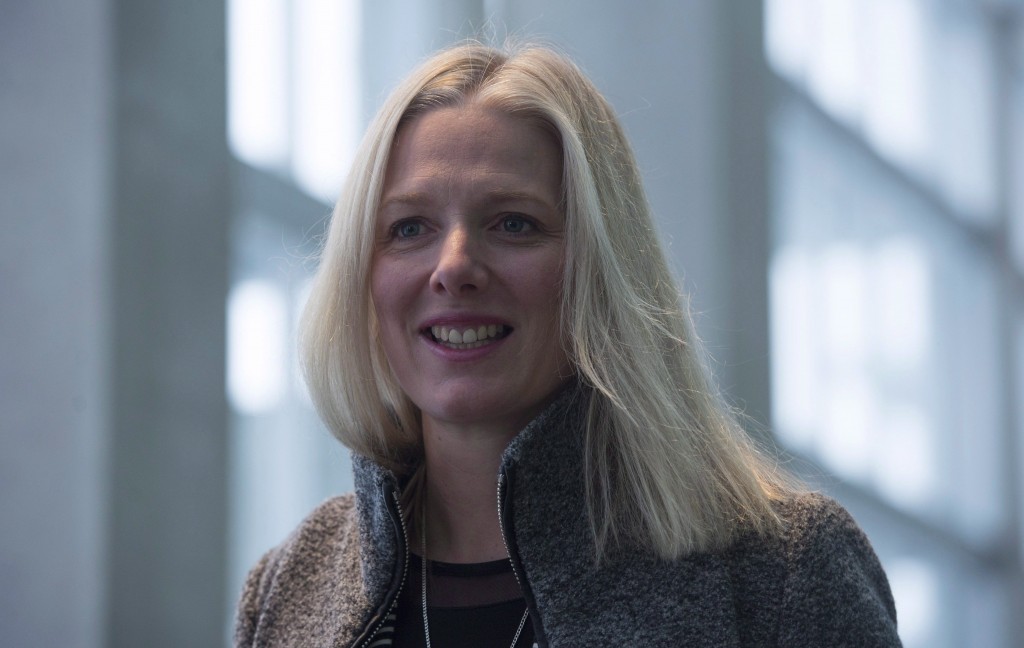The insiders’ perspective on Trudeau federalism 2.0
An important meeting with provincial and territorial leaders will be a test of the feds’ hug-it-out approach. Will it work?
Share

It’s going well, as Justin Trudeau heads toward a meeting with provincial and territorial premiers in Vancouver on March 3.
“You had to peel Quebec off the ceiling after the first federal memo went around,” a source in another province told me.
“Your sources are good,” an adviser to Quebec Premier Philippe Couillard said. “But not only Quebec. They also surprised Ontario and other provinces—B.C. and even Alberta.”
Why was the spatula needed for some remedial ceiling work? “It’s the old Liberal federal reflex,” my Quebec source said. “Centralization. We can criticize [Stephen] Harper a lot for not wanting to look after the environment, but on the other hand, when the provinces wanted to look after the environment, he wasn’t getting into their jurisdictions.”
But here’s the thing. As this Quebec government source (anonymous like all my other sources this week; sue me) recounted the Trudeau government’s first clumsy attempts to herd the provinces toward a climate-change strategy everyone could sign in Vancouver next week, his tone was more amused than outraged. The early problems were being fixed, he said.
Philippe Couillard feels that a key ally in making the whole process more province-friendly has been Justin Trudeau. Le fils de l’autre. Will wonders never cease.
Related: At the First Ministers’ summit, the meeting was the message
The main sin of “the federal machine,” this Quebec source said—in comments that were echoed in another conversation by a senior adviser to Ontario Premier Kathleen Wynne—was to forget that the provinces have been working, alone and in concert, to reduce their carbon emissions for a decade. Suddenly the feds show up and at first it was as if they thought they’d invented the notion.
“They’re proposing working groups on different subjects,” the Quebec adviser said. “Mitigation, clean technology, climate resiliency, ‘Let’s sit together with the Indigenous people, with the public in general’—it’s very Trudeauesque, là. ‘And we’ll reach agreement.’
“Attends une minute, là. Life isn’t like that. The provinces have their jurisdictions, there are committees, there are groups. The provinces have done a lot of consultations over the last 10 years. The provinces have their goals, they’ve done things. Now the feds come along as if nothing has been done before in Canada. There’s been nothing done by the federal government, I agree. But that’s not the same as saying nothing has been done in Canada.”
This apple-cheeked, “Hey-kids-let’s-put-on-a-show” approach was similarly amusing to the Ontario government, which has been deep in the emission-reduction trenches for years. Ontario closed all of its coal-powered energy stations, producing almost all of the emissions reductions Canada-wide. Processes to recreate processes were not super welcome.
But Wynne’s office didn’t even bother to reply to the early federal proposals, because they knew other provinces would complain and Ottawa would adjust. Indeed this seems to be what has happened.
“I’d tell you two things about Mr. Trudeau: Openness and sincerity,” the Couillard adviser said. “When the premier talks to him, he feels like he’s being listened to, and that when Mr. Trudeau has bought into the argument, his commitments are sincere and he makes things happen.”
The surprise is that anyone is talking this way about a Liberal prime minister named Trudeau in Quebec City. “But I’m telling you, he’s more of a Sinclair than a Trudeau,” my interlocutor said. The reference is to Jimmy Sinclair, the avuncular Vancouver Liberal who was the Prime Minister’s maternal grandfather.

Not everyone is writing glowing reviews of the meeting before it happens. Saskatchewan Premier Brad Wall is in the newspapers announcing that he will never accept a carbon tax. He may be pushing on an open door. “The truth is, that region’s got a lot of issues we’ve got to deal with,” a Trudeau adviser said. “We don’t want to get into a fight with premiers. You guys spill a lot of ink, everybody gets angry, and nothing happens.”
The feds, freshly admonished in the merits of flexibility, say there are many ways to cut carbon emissions. My federal source listed four. There’s “the built environment everywhere”—mostly old buildings that could be retrofitted with greener equipment. There’s transport, from cars to public transit, heavily concentrated in the country’s largest cities. There’s “extractive activities in the natural resource sector”—the huge amount of energy and carbon dioxide used to get valuable stuff, from oil to minerals to liquefied natural gas. And there’s carbon pricing, which would constrain the use of carbon-emitting technology anywhere a tax is levied or a cap-and-trade scheme imposed.
Any action by any government that tends to reduce emissions will be welcomed and, the Trudeau crew hopes, encouraged under a flexible set of policies whose nature will be the object of federal-provincial discussions long after the final gavel in Vancouver. If Wall doesn’t want a carbon tax, he can find another mechanism. (Besides, an official in another provincial capital said, “He’s usually quite different in the room than he is in the press beforehand.”)
There are many ways to skin this cat. Anything that works helps. “People always take their theology texts to these things,” the Trudeau adviser said, “but it’s really math class.”

Everyone will be staying after school to study. Catherine McKenna, the federal environment minister, has already been saying there’ll be no final agreement in Vancouver. Instead, four federal-provincial “work streams” will coordinate, from their respective capitals after the Vancouver meeting ends, on different projects. One group will try to identify job opportunities in expanding green-technology markets. A second will try to find some carbon-pricing mechanism that will be broadly acceptable. A third will look at all those emission-reduction strategies that aren’t about a carbon price. A fourth will accept that by now some climate change is happening despite all these meetings to try to stop it, and identify strategies for helping populations adapt as floods, extreme storms, coastal erosion and Arctic warming progress.
At least, that’s what an adviser to McKenna told me. This person cheerfully acknowledged that in advance of the Vancouver meeting, prep work in Ottawa is being led by the Prime Minister’s Office. And, as the provinces have been careful to remind the Trudeau crew, everything is open to amendment in Vancouver, based on work the provinces were already doing before Trudeau even led the federal Liberals.
The Vancouver meeting, then, stands somewhere near the midpoint of a process. This may be the emerging model for second-generation Trudeau federalism: low on confrontation and brinksmanship, high on consultation. It’s not dramatic. We’ll find out soon whether it works.